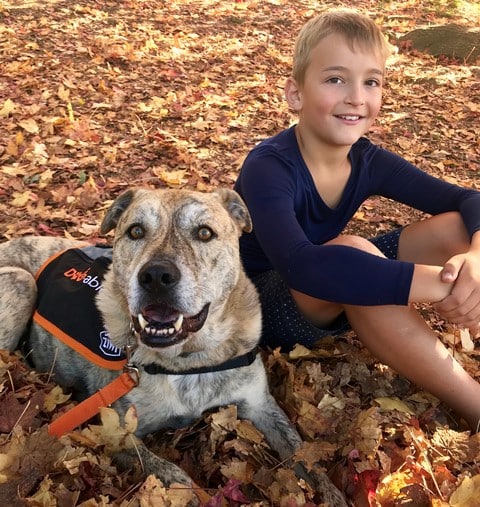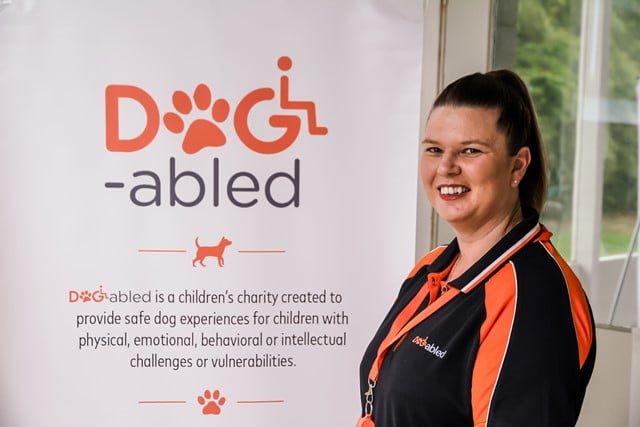Auckland students gain joy, confidence and so much more from DOG-abled NZ’s four-legged volunteers, writes Christine Neff.
A best friend. A constant companion. Dogs bring joy and love to nearly a million families all over New Zealand, and in some special situations they do even more than that.
Volunteers with DOG-abled NZ have seen dogs bring a socially anxious child out of their shell, allowing them to use their voice to confidently give commands. Young siblings from difficult family circumstances have grown closer with the help of a canine companion. Students once hindered by anxiety have gained the confidence to read aloud after practising their skills on a non-judgemental dog.

Jake hangs out with dog Dyson.
“Dogs are amazing animals,” says Heather Laanbroek, who founded DOG-abled NZ, a registered children’s charity based in West Auckland. “I’m always amazed by the changes I see in the children we work with.”
DOG-abled NZ is a small organisation of 14 human volunteers and 12 four-legged ones. The dedicated group works to provide safe dog experiences for children with physical, emotional, behavioural and intellectual challenges or vulnerabilities.
Several times a week, Laanbroek, accompanied by her trusty mastiff cross Dyson, or her sweet black labrador Django, meets one-on-one with small groups of children in a handful of Auckland schools.
Scroll through the organisation’s Facebook page and you’ll see photos of Django rolling in the sandbox, listening attentively to a student’s maths lesson or while a young girl reads aloud from a joke book. The DOG-abled dogs seem to enjoy school as much as Mary’s Little Lamb. And, unlike the nursery rhyme, educators welcome them.
“What I liked about DOG-abled NZ’s approach right from the beginning is that the organisation took time to educate all children in our school about how to safely interact with dogs to make sure it was a safe environment,” says Liz Manley, principal of Woodlands Park School in the Waitakere Ranges.

Heather Laanbroek. Photo: Victoria Logan of Stellanova Photography.
Woodlands Park began working with the programme earlier this year, selecting several children with additional learning needs to participate. “With Heather, we looked at individual children and decided on a very targeted outcome for what that child could gain by working with the dogs. The activities they do all depend on the needs of that child,” says Manley.
Those activities might include reading to a dog, helping to walk the dog, give commands or train tricks. One child, says Manley, played soccer with Django. Another used her relationship with the dog to gain confidence interacting with other children – the friendly dog became a sort of icebreaker to help her communicate and connect with new friends.
“Right from the beginning, we could visibly see the impact on the children,” Manley says.
That positive impact goes beyond the small group of children interacting directly with the DOG-abled Time with Tails programme. It’s an exciting day for everyone at Woodlands Park when Django or one of his friends come to school, says Manley.
“The children love it. They’re very respectful of the fact that the dogs have come into school to do a job. And I’m very proud of our children for that,” she says.
DOG-abled NZ launched in 2016, an offshoot of BARK NZ, a children’s charity that promotes dog safety education in schools. In addition to student sessions, DOG-abled NZ also provides Dogs Without Fear, a programme to help children and families overcome an abnormal fear of dogs, and library visits in which community children can interact safely and positively with the dogs.
That goal of ‘positive interaction’ is especially important to the organisation’s leadership. Volunteers undergo training and attend workshops. Dogs are specifically trained and independently assessed. It’s a full commitment to volunteer for DOG-abled, but this ensures they provide the safest and highest quality animal-assisted education experience, a goal that’s paramount to the organisation.
“We’re very proud of the work we do for Auckland children, and we hope to continue growing this programme to help even more” says Laanbroek. “We know our dogs have more love to give.”
- Learn more about DOG-abled NZ by checking out Facebook.
- If you know of a child who could benefit from the programme, reach out to Heather Laanbroek.
- Christine Neff is a DOG-abled NZ volunteer
- This article first appeared in the Parent to Parent December 2018 magazine


